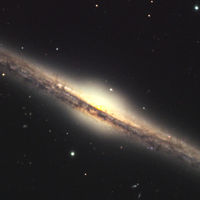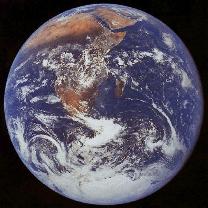 |
Flying Saucers
Strange lights in the sky
once believed to be deities
are now explained away
as pure imagination
~ beep, beep ~
|
|
|
|
We Make Great Pets
Aliens from other planets, coming here, would be higly advanced; higly evolved.
So far along might they be, so ancient their race: that their dogs, their bunnies, might be more sentient than us.
This seems to be the case, judging by stories of various alien species encountered:
the smaller Grays seem obviously subservient to the larger, menacing,
Praying Mantis resembling, super-insects from outer space.
But what if these species evolved on the same planet
- or perhaps the elder seeded the younger, even in another system
- or even the other way around?
Who knows? It's a big Universe.
Zeta Reticuli, only 40 light years away (inches, by galactic standards)
is a pair of yellow-dwarf stars very much like ours.
The relatively extreme conditions of a binary system
might evolve a species more drastically, dramatically, dynamically
- and might also propel a sentient society into space sooner.
There might easily be heavier elements naturally occurring within,
making such endeavors all that much more feasible.
Space travel may well be the natural condition for beings like us:
the next logical step in our development.
From there, who can guess now?
But we may find out, out there.
Or not. It's a big Universe.
|
|
|
|
|
 |
M88 - Type Sc Spiral Galaxy
60 Mly away, 130 Kly across
|
|
|
|
 |
NGC 4565 - Needle Galaxy
31 Mly away, 100 Kly across
|
|
|
|
 |
M51 - Whirlpool Galaxy
31 Mly away, 200 Kly across
|
|
|
|
|
There are over 100 star systems within only 20 light years, thousands within 100
- like a string of islands, sometimes spread out, sometimes clustered together
- but it's a very Local Neighborhood, a tiny dot in our vast galaxy.
The Milky Way Galaxy is a mostly flat, spiral disc over 100,000 light years (ly) across;
bulging in the middle to 20,000 ly thick; very thin by us, at 3000 ly, roughly two thirds of the way out.
In our galaxy alone, estimates range from 100 billion to 10 trillion stars.
Even the most conservative of scientists allow that life, in some form, must exist somewhere
- the more open minded speculate even intelligent life, in some form, might be prevalent in each of them.
Given the age of the galaxy, (our sun is a third generation star),
the existence of a space based society, in some form,
seems a certainty, even in our Local Neighborhood.
But it's like walking in, in the middle of a movie.
Anyone want to tell us what's going on?
So, why haven't they landed on the White House front lawn?
Why aren't we applying for the United Federation of Planets?
Why aren't we their servants, or slaves? Perhaps we are and don't even know it.
Perhaps they have no use for us - or they're waiting for us to develop one.
Maybe they've been watching us for thousands, even millions of years,
perhaps from Mars, or a Space Base on the far side of our tidal-locked geocynchronous moon:
influencing our society, and even our evolution. Oh, really.
What other hobbies do they have?
Our development (as a species, as a society) has taken many twists and turns
- even in just the last several thousand years, (of which we are most sure): we're just waking up.
Technology, culture, spirituality, economics; humans are toddlers,
and we're making things up as we go along, or that's the impression.
There is no certainty that any other species evolved along the same lines.
Maybe, on their planet, in their system, radio was not a viable means of communication.
Different natural resources open different societies in different directions
- cultures based on those foundations.
If superconductors are common on Rigel 12, we're no match for 'em.
But if they could destroy us whenever they want, and they haven't yet
- does that mean they're good guys?
Not necessarily.
Imagine an alien race: say, only a couple thousand years ahead of us;
and a couple dozen light years away, just venturing out into the Local Neighborhood
- and the first sentiently inhabited planet they come across is using radio, TV,
and all kinds of things they weren't even looking into until they started living substantially outside their home system.
What would they make of us? What would we make of veritable headhunters with exquisite wine and ball point pens?
Or perhaps they came upon us much earlier: as cavemen; as apes.
Or, on the other hand, we could be hamsters: to menacing Reptilians - considering lesser species like us as prey.
What if there were hundreds of species, just within local reach, all with different upbringings, different motivations
- each with their different place in a vast, complex, alien society?
One learns to find one's place.
If the Alien Phenomenon is related to Crop Circles, Cattle Mutilations, etc; it's a parent (or of an elder generation).
But Alien Abductions is what makes it all real - brings it all home, ties it all together - gives a meaning to the mystery.
What could the aliens want with a cow's reproductive organs, eyes, tongue, every last drop of blood (and a few other things)
- but nothing else - and what could they want with us?
And what are Crop Circles all about?
Are they universal symbolism for species which have no practical or informal translation protocol?
If the messages are intended for anyone down here, whoever they are, perhaps they're wise to not talk about it.
What if the presence of one alien species brought us and our humble little world
to the attention of another, yet even more highly evolved?
"What could they be so interested in?" they might ask themselves while passing by, or even just looking from home.
Maybe they already know.
It's hard to imagine sometimes,
but the sheer scope of intelligence one must expect from any alien species
able to bridge the gap between stars - well, it boggles the mind.
Or perhaps the leap in technology isn't really so very far off after all.
The trick is, once we get out there, will we be able to deal with the neighbors?
What will we have to barter with?
We might need their help on everything.
|
|
|
|
|
|
Our evolution is dependant on many factors.
For one thing, survival.
If we don't make it off this rock before another dinosaur killing asteroid comes right this way, we're done for.
In that case, the only possibility this particular variety of Human species has for continued existence
is if aliens saved our DNA to deposit on some other, safer world somewhere.
Maybe they've done that anyway - without our permission.
Maybe they felt they didn't need it.
Also, our tiny blue world, among the infinite wonders of interstellar nature,
seems to have a deadly cycle to it - deadly to us, anyways.
Upon further investigation, a regular cycle of Ice Ages and Global Cataclysims
appears to be periodically wiping Earth's face clean
- a fresh, blank page to start over.
It looks like we'll make it this time, though (unless there's something else we don't know).
We seem to have (been) evolved enough, at the last stroke of twelve, to have been able to tell time;
enough to plant crops and start a civilization that has a chance this time
- even if our progress hastens the end a bit.
|
|
|
|
But then again, there is that pesky Missing Link.
Despite the overwhelming consensus,
we do not have solid conclusive evidence
that Humans evolved entirely on this planet
- and maybe none is possible.
Oh, it looks the case - there's a definite dotted line, from primordial slime, in our direction;
but the earliest primitives had brains just as big as ours.
Could they have been throwbacks; stranded, or offshoots from an earlier alien try at it?
From monkeys to Australopithecus, we're all primates
- but is it really a string of gradual incremental improvements?
How could it be a dozen million years between pre-apes,
feeling very smart, licking sticks to fish for ants;
to early modern humans building a fire to cook a bison;
and then only a few thousand more to make it to the moon?
What's the average projected time it takes for a species to make it out into space
- and what's the survival rate beyond that?
On this world, for us, more protein meant bigger brains.
But other worlds have different conditions, different ecosystems
- alien species might have very different nutritional needs.
There could be electricity in the air, so to speak.
We can only guess what ants or dolphins talk about - or for that matter, flowers.
|
|
|
|
There is no solid evidence of Human civilizations on this world, superior to ours. Or is there?
Nothing on our level, nothing we would recognize.
Off world, that's a different story.
The Face on Mars is the most popular, and ridiculous sounding enough to be permanently dismissed by nearly everyone.
But there are pyramids near the Face - a complex collection
- all arranged precisely on angles based on math so elegant and complex
that the only thing we have even touching on it is called Sacred Geometry
- yes, "Sacred Geometry"
- by the ancient-most sources; and rarely in use today.
Or is it?
We've taken another path.
But perhaps that's a road which, earlier in our history, we took beyond the temples and scrolls
- to Mars and beyond, but then something happened: no one lives there any more, as far as we can tell.
Mars is a world which, we now know for sure, once looked and behaved very much like ours.
Even after so great a change, we are able to dream that we can make it habitable one day
- that's how similar it is - and that's how easy it is, that we can figure that out, this early on.
We've barely been off the planet and "terraforming" is a word.
Even Venus has a few think tanks devoted to it.
Well, we've made it this far - do we have a future?
In all probability: if we manage to develop beyond violence and greed, or find a way to make that work for us.
And maybe that sort of thing is an integral part of whatever society is currently looking down on us.
Whatever works.
The important thing is, space isn't our native environment - we will have to adapt to that eventually.
And, we will have to adapt to the politics of whatever society is currently dominant in our Local Neighborhood.
One hopes there's a friendly Federation: with a nice, friendly Prime Directive; but chances are not.
All the evidence in, so far, suggests we are not respected as rulers of our own destiny,
worthy of consent before being plucked from our bedrooms and up into the mothership.
But again, it seems if they wanted to destroy us: they could, very efficiently, anytime they choose.
Maybe it's just easier to let nature take its course.
|
|
|
|
 |
Spectral interpretation of Cydonia, Mars (Face: top, center)
showing the region was once a seashore:
with all anomalous non-fractal monuments just above the ancient sea-level.
|
|
|
|

Genetic Curriculum
As a species becomes increasingly sentient, that trait becomes a part of their natural identity
- and an important factor in their survival, as intelligence begins to substitute for adaptability.
As they begin to voyage beyond their natural ecosystem (for example: out into space and on other planets);
physically, they will encounter widely variant conditions which will cause them to use their intelligence and technology
if they are to continue existence in that environment:
Magnetism, gravity, radiation, atmospheric pressure, microscopic lifeforms
- things we take for granted as constants here on Earth
- our domesticity will have to be tapered with wisdom if we are to make such a migration, ourselves.
At some point, one must imagine, intelligence might be completely substituting (and substitutive)
- all adaptability being artificial.
One running theme in the abduction phenomenon:
reports from abductees of scientific experiments,
especially of our reproductive systems; mass cloning projects;
and being treated like a specimen in the wild
- and from their perspective, we are.
Earth is an ant-farm.
Maybe it's just simple scientific curiosity.
Maybe we have something they need.
Maybe it's their frugal policy to investigate everything thoroughly, before contact
- even preventing discovery, until such conclusions are arrived.
There may be many worlds like ours, on the edge of exploration.
teetering on the brink of destruction, annexed for our resources.
The first places we plan to visit, beyond the Moon and Mars:
the Gas Giants (Jupiter, Saturn, Uranus and Neptune).
Venus and Saturn's one major moon, Titan, also have thick, complex, intense atmospheres
- which arguably (even conservatively) have all the essential components for life as we know it
(it would just work differently, and there's no reason to assume that it shouldn't).
And we wonder: what odd beings might exist under such extreme conditions.
Even if they have no physical way of leaving their worlds,
their technology, their very existence, would seem like magic to us
- perhaps masters of magnetism, and pressure:
causing winds and lightning at the merest natural thought.
And these might be their chosen medium of communication.
Perhaps they would notice our radio and television:
and maybe it would seem like gibberish, to them;
our emitted electromagnetic signals, radiation, space probes;
seen as intrusive, accidentally harmful, even hostile.
How would we make our intentions known to them?
And who would speak for us?
On Earth, we humans have taught some primates sign language.
But elephants, giraffes and whales are known to use infra-sound:
these are sonic vibrations of such low frequency that humans cannot hear, or even feel them.
They were only accidentally discovered by playing a tape back, on slow speed.
We now assume that this form of communication, very efficient across long distances,
relates vital information about food, water, mating, even potential predators
- in the wild, most things are about immediate survival.
But these animals have been aware of us forever: drums; the sound of a crowd; construction; warfare.
And, as we introduce automobiles, and powered ships, steady humming engines, into their environment;
perhaps they wonder what to make of us, but it is supposedly only a question of threat, or not.
We are unlike any other animal they ever encounter.
They probably have no hope, or designs, of ever understanding us, on our terms, on their own.
If we're ever to have any sort of meaningful relationship with these creatures,
the initial efforts will have to be largely our own.
|
|
|
|

|
But perhaps the most promising prospect for local extra-terrestrial life, within our reach, is Europa:
the second of the four major moons of Jupiter
- a global ocean of liquid water, hundreds of miles deep,
shielded from space, and Jupiter's radiation, by a layer of ice several miles thick.
And Titan was recently found to have lakes of liquid methane near its poles.
Even Mars is now known to have water, in some form or other
- an entire second planet, right next door,
just waiting to be awoken from its frozen slumber.
But what life is already anywhere?
Some of the nearest stars might also have very good prospects for life
(that is, like Earth, for humans to exist upon some worlds there, as we are now):
Alpha Centauri, Tau Ceti; there are about 20 sun-like stars within just 20 light years of us.
If planets similar to ours evolved around them as well, we may ultimately be able to make claim to them,
if there isn't someone else already there (though that has historically been little concern).
Also Sirius, Vega, Altair: blue sub-giants, thought to be inhospitable environments for a world like ours to ever develop.
But who knows what else alive those extreme conditions might have produced?
When we get out that far, if we discover any sea creatures
- especially if any are as intelligent as whales or dolphins
- we will surely want to learn everything we possibly can about them.
And if we have the means, we might want to do some experiments of our own.
Our very survival there, or elsewhere, may depend on it.
Maybe the cure for cancer is on Wolf 359.
|
|
|
|
But any extra-solar colonization by humans will be very far off in the future
- perhaps many thousands of years
- unless we get some help from the neighbors.
At our current level of technology, having not yet reached FTL
(faster than light) travel, voyage into space would take forever.
Even our fastest prototypes, Ion Drive, would take something like 40 years
to reach the nearest star, Alpha Centauri, at only 4 light years away.
Whatever probes survive whatever adventures along the way
(in the vast, perhaps occasionally dusty, dark-matter distances between even two neighboring stars):
by the time we establish a communications beacon, we might have already sent something better.
Without FTL, exploring the system next door would be a centuries-long endeavor.
Manned probes, colonies: beyond feasability.
A space station sounds nice, but it's much safer on a planet or moon;
with an atmosphere, or underground; if there's asteroids, radiation, anything else.
In that case, there being only a handful of similar stars within robot's reach of us,
we might better first concentrate our exploration efforts more locally - unless we absolutely have to.
After a millennia of branching out to the Moon, Mars and beyond,
we may acquire, through our own observations, a deeper understanding of space science
- what to expect on other worlds around other stars;
but still, only experience in our own system.
All of this, any star-hopping alien probably already knows,
without ever even setting foot in our star system.
If there here, like we think they are,
they've probably already thoroughly mapped
every planet and moon in every system in the area.
These are people we might like to get to know better.
But what would be the baseline qualification for contact?
In Star Trek, the Prime Directive is in place until a planet reaches FTL (warp)
- the crew must disguise themselves as locals, avoiding detection at all costs.
In the movie Contact (written by Carl Sagan), a strong enough television signal was all it took
- a message was sent back, at the speed of light,
arriving here some fifty years after it was transmitted.
But as far as Extra Terrestrials are concerned,
we are likely considered a hostile planet:
our chief activity being tribal warfare.
In many ways, we may remind them of themselves;
or even other more infamous races which have long killed themselves off.
They may be waiting to see what happens first.
We could be teetering on the edge of an evolutionary curve.
Too much technology too soon, before we've developed the social skills to avoid annhilation.
Or, perhaps facism works for some
- some of the abductees' experiences
are very reminiscent of Nazi death camps.
A "Master Race" could have overpowered its entire world,
thereby forever losing some genetic edge
- and they've come here to look for it in us.
|
|
|
|
|
|
artists impression
of a cloaked UFO
over a major city
|
|
|
|
|





